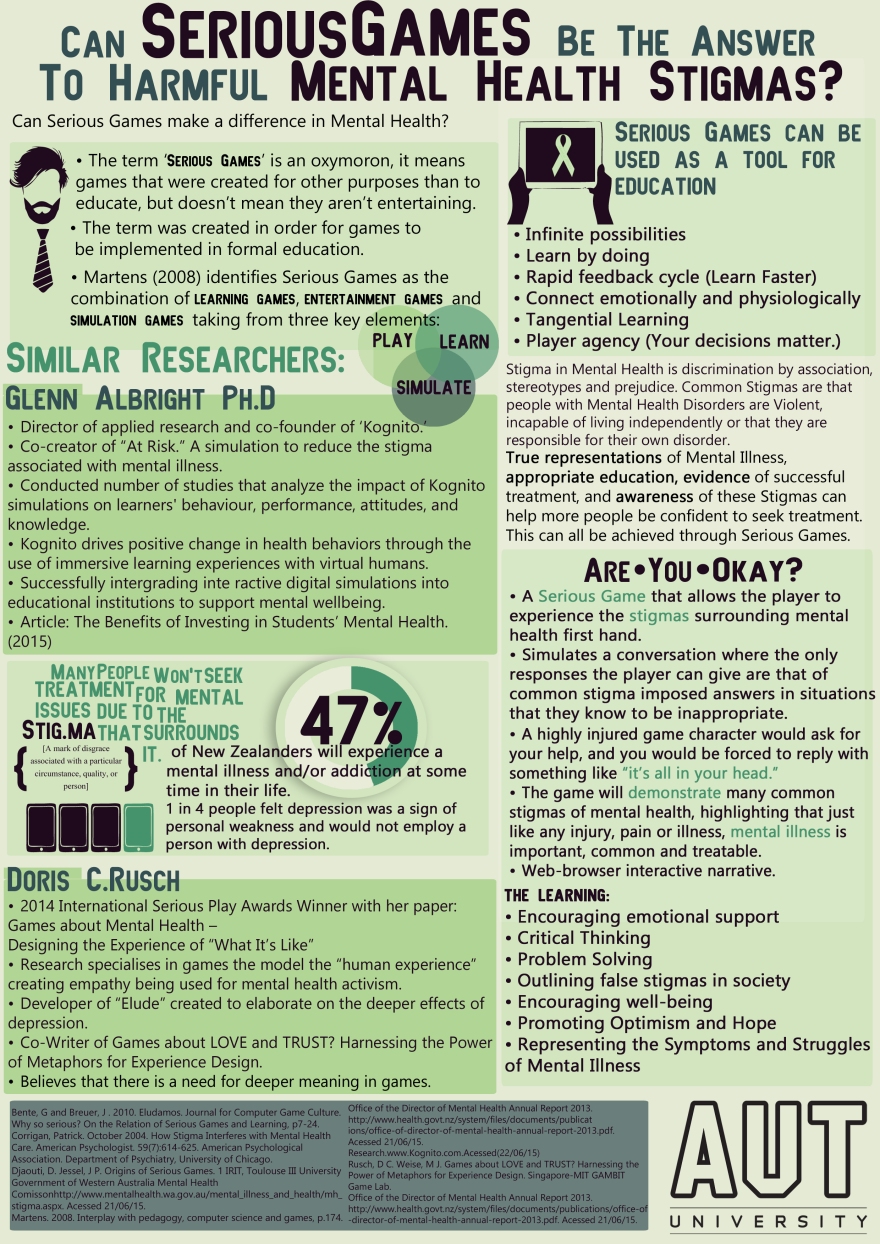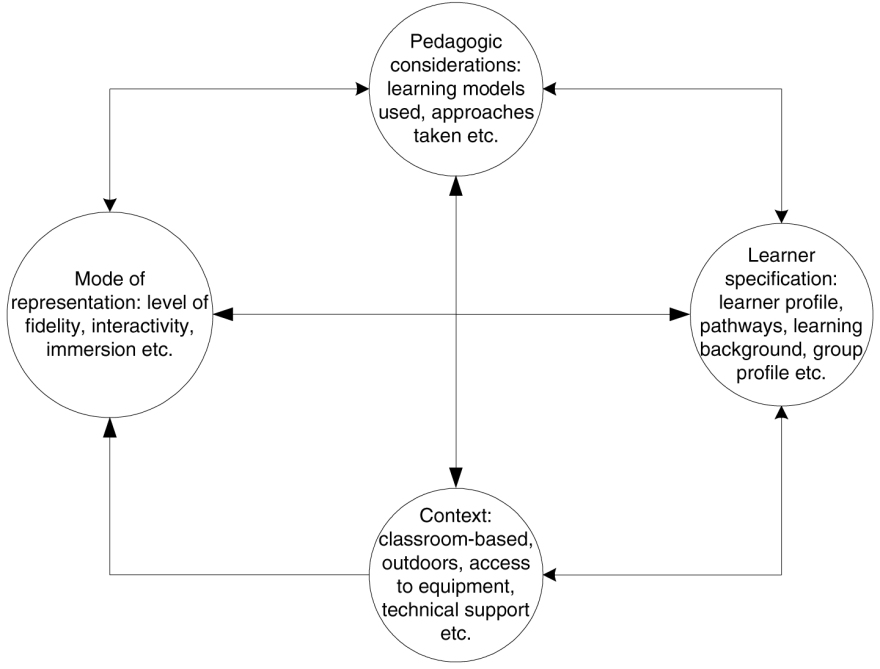Category: Academic Research
Research Conclusion
My question is… Can Serious Games be the Answer to Harmful Mental Health Stigmas?
Serious Games can be used as a Tool for education-
- Infinite possibilities
- Learn by doing
- Rapid feedback cycle (Learn Faster)
- Connect emotionally and physiologically
- Tangential Learning
- Player agency (Your decisions matter.)
I wanted to create a Game that can take advantage of the key aspects of design that are available through serious games to benefit a cause for well-being.
The Stigma Surrounding Mental Health – Game Based Learning
One of the reasons why people avoid Mental Health services when they need them is the Stigma that surrounds it. Many people face the wrong ‘label’ of mental illness and the harm it brings. The Stigma has two kinds of effects, the effect on your self-esteem and the effect on social opportunities. Patrick Corrigan in “The American psychologist” journal says
“recommendations are reviewed for ongoing research that will more comprehensively expand understanding of the stigma–care seeking link. Implications for the development of antistigma programs that might promote care seeking and participation are also reviewed”
If within psychology there is a gap for a system to efficiently decrease the Stigma surrounding Mental Health, then I believe Game Based Learning or Serious Gaming may be the answer.
Continue reading “The Stigma Surrounding Mental Health – Game Based Learning”
Doris C. Rusch
GAME DEVELOPER AND RESEARCHER, FOCUSING ON SOCIAL IMPACT GAMES, EXPERIENCE DESIGN, PLAY AND MENTAL HEALTH ACTIVISM.
Some of her research and development work includes:
Doris C. Rush was a Assistant Professor for game design at DePaul University in Chicago. Working on the paper “Games about Mental Health – Designing the Experience of “What It’s Like”” The paper consists of designing four short games about various mental illnesses. The aim of each game is to increase understanding, empathy and eliminate stigma and isolation.The work received a silver award in the 2014 International Serious Play Awards.
ARTICLE: http://www.fdg2014.org/papers/fdg2014_demo_10.pdf Games: http://fortherecords.org/
In her Post Doctoral work at GAMBIT Game Lab she co developed “Elude” a game created to elaborate on the deeper effects of depression. The goal with making the game was to raise awareness and understanding for people surrounding anyone with a Mental Illness. The game hopes to remove the stigma that depression is simply ‘sadness’ and teach that it is more of a complex hopelessness feeling, with a failure to be able to connect with the outside world.
New Zealand Mental Health Statistics
KEY FINDINGS:
- About 47% of New Zealanders will experience a mental illness and/or addiction at some time in their life.
- 1 in 5 people effected within one year.
- Approximately 500 New Zealanders die by suicide every year.
- 40% of those were diagnosed with a mental health disorder.
- In an Australia study Nearly 1 in 4 people felt depression was a sign of personal weakness and would not employ a person with depression.
- One in 5 said that if they had depression they wouldn’t tell anyone.
Kognito – Creators of “At-Risk”
On the Games for Change website I came across a game with the similar objective of removing the stigmas of Mental Health. “At Risk” is a simulation game that teaches educators about Mental Health and Mental Health Stigmas. So I looked further into its developer Kognito.
Kognito was established in 2003 by co-founders Ron Goldman, CEO and Glenn Albright, Ph.D., director of applied research. Based in New York Kognito’s team is made up of 35 full-time leading experts, psychologists, instructional designers, graphic designers, marketing and sales professionals, researchers and software engineers.
Kognito focuses on immersive learning experiences that drive positive change in health behaviors. They have have created several award winning games based on academic science-proven research and are implemented in community colleges, public and private colleges, universities and online institutions.
The Definition and Usefulness of The Term Serious Games
Within the Game Based Learning research community there isn’t a fixed definition of the term ‘Serious Games.’ The general consensus is that Serious Games are games that have another purpose other than to just entertain people and/or have the intention of teaching specific predefined skills or knowledge whether it be integral to the game or is developed through deeper thinking.
In Origins of serious games Damien Djaouti and Jean-Pierre Jessel debate the term ‘Serious Games’ as being an oxymoron. Saying that video games have been shown as useful in education, and many educational games are “Serious” so the term “Serious Games” isn’t really a oxymoron. However there are many examples of games having both education and entertainment, through both direct and in-direct learning approaches, this creating the definition of serious games as “games that do not have entertainment, enjoyment or fun as their primary purpose” (Michael & Chen, 2005) rather than the definition that games that are solely focused on education.
In the book “Serious Games” by Clark Abt (1970) he explains “Games may be played seriously or casually. We are concerned with serious games in the sense that these games have an explicit and carefully thought-out educational purpose and are not intended to be played primarily for amusement. This does not mean that serious games are not, or should not be, entertaining.”
Continue reading “The Definition and Usefulness of The Term Serious Games”
The Relationship Between Games, Serious Games, Simulations, Educational Simulations, and Virtual Worlds
Games, Serious Games, Simulations and Educational games all share the same word, play. They all l feature some type of interaction within a ‘game space.’ All of these game types allow players the ability to learn or use a particular set of tools, motions or ideas to a point. There are a couple of different ideas and controversy about what a game actually is and the relationship between the different types. This is my interpretation of the relationship between games from reading some of those ideas.
Clark Aldrich in his article Virtual Worlds, Simulations and Games for Education describes the different game types. He says that entertainment games are more fun  and engaging activities. They are played in virtual worlds structured by specific rules and constraints, and are different to simulations because they aren’t as defined. For example, “FlappyBird” can be seen as a entertainment game as it has no further goals than entertainment and achievement. It also has a high level of constraints that aren’t defined as useful simulations.
and engaging activities. They are played in virtual worlds structured by specific rules and constraints, and are different to simulations because they aren’t as defined. For example, “FlappyBird” can be seen as a entertainment game as it has no further goals than entertainment and achievement. It also has a high level of constraints that aren’t defined as useful simulations.
How can Games Support Education? – Games as an Important Teaching Tool
It can easily be said that digital games have the potential to be an important teaching tool because of their interactivity, engagement and immersion.
Serious games enable players to experience situations that otherwise would be impossible due to the cost, the amount of time, location and safety reasons. It mainly does this through the Simulation within the game that helps the players experience something that in the real world would be physically impossible to achieve. For example “Second Life” where you and create almost anything within a 3-dimensional fictional environment. Games can support education because they can provide a learning experience without the limitations of the real world.
does this through the Simulation within the game that helps the players experience something that in the real world would be physically impossible to achieve. For example “Second Life” where you and create almost anything within a 3-dimensional fictional environment. Games can support education because they can provide a learning experience without the limitations of the real world.
Continue reading “How can Games Support Education? – Games as an Important Teaching Tool”
Methods for Assessing Appropriateness and Effectiveness for Games and Teaching
Within education, methods need to be formally put in place as way to assess the appropriateness and effectiveness for Games and Teaching. Tutors when introducing game based learning to their practice may be faced with questions about validity of the content and which pedagogic approaches they should be using. There is also the possibility of a mismatch between content, leading to inappropriate terminology and approaches not supported by evidence-based research. (Freitas and Oliver 2006)
Sara de Freitas and Martin Oliver describes in 2006 Computers & Education four interrelated methods that can be used for assessing games and teaching:
Image from S. de Freitas, M. Oliver / Computers & Education 46 (2006) 249–264
The method is designed to allow practitioners to be more critical about how they apply game based learning to the classroom environment.
Continue reading “Methods for Assessing Appropriateness and Effectiveness for Games and Teaching”


